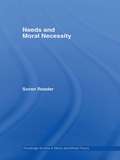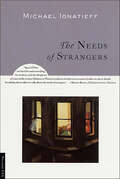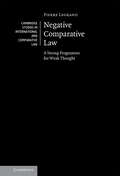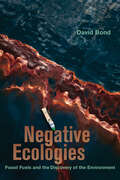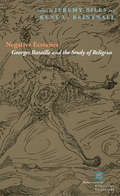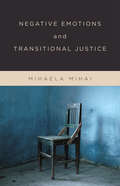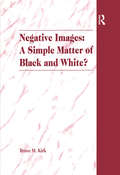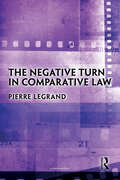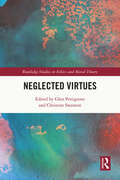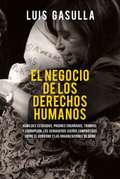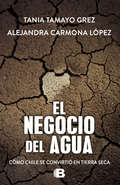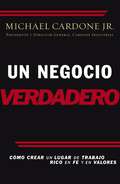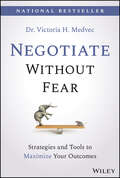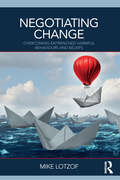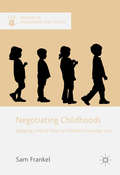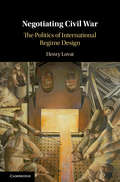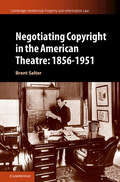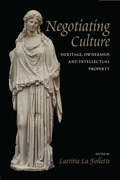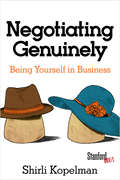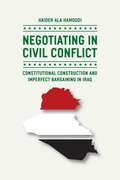- Table View
- List View
Needs and Moral Necessity (Routledge Studies in Ethics and Moral Theory #Vol. 9)
by Soran ReaderNeeds and Moral Necessity analyses ethics as a practice, explains why we have three moral theory-types, consequentialism, deontology and virtue ethics, and argues for a fourth needs-based theory.
The Needs of Strangers
by Michael IgnatieffThis thought provoking book uncovers a crisis in the political imagination, a wide-spread failure to provide the passionate sense of community "in which our need for belonging can be met." Seeking the answers to fundamental questions, Michael Ignatieff writes vividly both about ideas and about the people who tried to live by them-from Augustine to Bosch, from Rousseau to Simone Weil. Incisive and moving, The Needs of Strangers returns philosophy to its proper place, as a guide to the art of being human.
Negative Comparative Law: A Strong Programme for Weak Thought (Cambridge Studies in International and Comparative Law #167)
by Pierre LegrandWritten under the sign of Beckett, this book addresses comparative law's commitment to the deterritorialization of the legal and its attendant claim for the normative relevance of foreign law locally in the fabrication of statutory determinations, judicial opinions, or academic reflections. Wanting to withstand the law's persistent tendency towards nationalist retrenchment and counter comparative law's institutional marginalization, the fifteen essays at hand impart radical and discerning intellectual equipment in order to foster the valorization of the legally foreign and the comparative motion. In particular, the critique informing this manifesto examines pre-eminent topics like culture and difference, understanding and translatability, objectivity and truth, invention and tracing. Harnessing insights from a range of disciplinary discourses, this book contends that comparatists must boldly desist from their field's dominant epistemology and embrace a practice much better attuned to the study of foreignness.
Negative Ecologies: Fossil Fuels and the Discovery of the Environment
by David BondSo much of what we know of clean water, clean air, and now a stable climate rests on how fossil fuels first disrupted them. Negative Ecologies is a bold reappraisal of the outsized role fossil fuels have played in making the environment visible, factual, and politically operable in North America. Following stories of hydrocarbon harm that lay the groundwork for environmental science and policy, this book brings into clear focus the dialectic between the negative ecologies of fossil fuels and the ongoing discovery of the environment. Exploring iconic sites of the oil economy, ranging from leaky Caribbean refineries to deepwater oil spills, from the petrochemical fallout of plastics manufacturing to the extractive frontiers of Canada, Negative Ecologies documents the upheavals, injuries, and disasters that have long accompanied fossil fuels and the manner in which our solutions have often been less about confronting the cause than managing the effects. This history of our present promises to re-situate scholarly understandings of fossil fuels and renovate environmental critique today. David Bond challenges us to consider what forms of critical engagement may now be needed to both confront the deleterious properties of fossil fuels and envision ways of living beyond them.
Negative Ecstasies: Georges Bataille and the Study of Religion (Perspectives in Continental Philosophy)
by Jeremy Biles and Kent L. BrintnallDespite Georges Bataille’s acknowledged influence on major poststructuralist thinkers—including Foucault, Derrida, Kristeva, Lacan, Baudrillard, and Barthes—and his prominence in literary, cultural, and social theory, rarely has he been taken up by scholars of religion, even as issues of the sacred were central to his thinking. Bringing together established scholars and emerging voices, Negative Ecstasies engages Bataille from the perspective of religious studies and theology, forging links with feminist and queer theory, economics, secularism, psychoanalysis, fat studies, and ethics. As these essays demonstrate, Bataille’s work bears significance to contemporary questions in the academy and vital issues in the world. We continue to ignore him at our peril.
Negative Emotions and Transitional Justice
by Mihaela MihaiVehement resentment and indignation are pervasive in societies emerging from dictatorship or civil conflict. How can institutions channel these emotions without undermining the prospects for democracy? Emphasizing the need to recognize and constructively engage negative public emotions, Mihaela Mihai contributes theoretically and practically to the growing field of transitional justice. Drawing on an extensive philosophical literature and case studies of democratic transitions in South Africa, South America, and Eastern Europe, her book rescues negative emotions from their bad reputation and highlights the obstacles and the opportunities such emotions create for democracy. By valorizing negative emotions, either through the judicial review of transitional justice bills or the criminal trials of victimizers, institutions realize the value of respect and concern for all while contributing to a culture that is hospitable to democracy.
Negative Ethnicity: From Bias to Genocide
by Koigi Wa Wamwere"Negative ethnicity" is Koigi wa Wamwere's name for the deep-seated tensions in Africa that the world has seen flare so terrifyingly. The genocide in Rwanda and "ethnic" killing in the Democratic Republic of Congo, Nigeria, and elsewhere stand out as examples. Wa Wamwere argues that these clashes cannot properly be described as ethnically motivated; ethnicity, a positive distinction, has nothing of the hatred here at work. Negative Ethnicity gives a new picture of the force behind untold deaths on the continent, dispelling the myth of an intractable conflict waged along simple, ancient lines.Negative Ethnicity explains the roots, colonial and pre-colonial, of the current "ethnic" tensions. It goes on to describe how, for most Africans, ethnic identity is ambiguous, and analyzes why that fact is obscured. The culprits are many: chronic poverty, a broken education system, preying dictators, corrupt officials, the colonial legacy of hate, the ongoing exploitation of the West.Negative Ethnicity is both a history and a manual for change, intended to introduce Westerners to the crisis and to give Africans a new understanding of it. Perhaps never before has the problem been addressed with such clarity and insight.
Negative Images: An Examination of 'Race' and the Juvenile Justice System
by Bruce M. KirkThat black young people have been subject to unequal treatment in the youth justice system has been the belief of some individuals and groups, reinforced, at best, by anecdotal evidence. Negative Images: A Simple Matter of Black and White? provides not only evidential weight to uphold this view but also provides some insights into the processes by which it comes about. Findings of a case study detailed in the book demonstrate how in one youth court black youths were over-represented amongst those receiving high-tariff sentencing and that this over-representation could not be explained by seriousness or persistence of offending. Whilst responsibility for differential sentencing has often been laid at the door of Magistrates, this study reveals how social work court report practice may be contributing to the situation.
The Negative Turn in Comparative Law
by Pierre LegrandThis book’s essays aim subversively and resolutely to replace the hegemonic discursive frame governing comparative law. Beyond harnessing negative critique to resist the orthodoxy’s self-assured cognitive assumptions, at once unexamined and indefensible, the argument mobilizes negativity as an empowering idea, a resource towards the displacement of the brand of comparative law that has been fostering a closing of the comparing mind. To answer the demands of the moment and herald foreign law research as a creditable intellectual development, one requires to engage in a culturalist theorization and practice of comparative law at radical variance from the prevailing positivist model. The negative turn, then, is a call to comparative action – a comparactive motion – in support of the robustly indisciplined thinking that must thoroughly inform research into foreign law. In photography, the negative has been employed productively to generate a positive print. In comparative law, negation wants to affirm edifying epistemic yields.This book will benefit all law teachers and postgraduate law students interested in the workings of law on the international scene, whether specialists in comparative law, public international law, private international law, transnational law, or foreign relations law – in particular, individuals bringing to bear a critical inclination to their subject-matter.
Neglected Policies: Constitutional Law and Legal Commentary as Civic Education
by Ira L. StrauberIn Neglected Policies, Ira L. Strauber challenges scholars and critics of constitutional jurisprudence to think differently about the Constitution and its interpretation. He argues that important aspects of law, policies, and politics are neglected because legal formalisms, philosophical theories, the reasoning of litigators and judges, and even the role of the courts are too often taken for granted. Strauber advocates an alternative approach to thinking about the legal and moral abstractions ordinarily used in constitutional decision making. His approach, which he calls "agnostic skepticism," interrogates all received jurisprudential notions, abandoning the search for "right answers" to legal questions. It demands that attention be paid to the context-specific, circumstantial social facts relevant to given controversies and requires a habit of mind at home with relativism. Strauber situates agnostic skepticism within contemporary legal thought, explaining how it draws upon sociological jurisprudence, legal realism, and critical legal studies. Through studies of cases involving pornography, adoption custody battles, flag burning, federalism, and environmental politics, he demonstrates how agnostic skepticism applies to constitutional issues. Strauber contends that training in skeptical critique will enable a new kind of civic education and culture--one in which citizens are increasingly tolerant of the ambiguities and contradictions inherent in the law and politics of a pluralistic society. Using insights from the social sciences to examine the ways constitutional cases are studied and taught, Neglected Policies will interest scholars of jurisprudence, political science, and the sociology of law.
Neglected Virtues (Routledge Studies in Ethics and Moral Theory)
by Christine Swanton Glen PettigroveMuch of the work that has been done on virtue has been devoted to getting virtue ethics a seat at the theoretical table. It has been concerned with showing that virtue ethics can provide a satisfactory account of right action to rival accounts offered by consequentialism and deontology. This volume of essays explores the nitty-gritty details of particular virtues. It includes original contributions from a number of leading scholars in virtue ethics. Most of the virtues discussed – such as ambition, cheerfulness, creativity, magnificence, pride, wit, and wonder – have been almost wholly neglected by contemporary ethicists. The volume also includes coverage of other virtues that have received a fair amount of attention in recent years, such as charity, hope, justice, practical wisdom, and temperance. Here the essays address largely ignored dimensions of these virtues and show how these discussions can enrich our understanding of neglected virtues. Neglected Virtues is a welcome addition to the scholarly literature on virtue ethics. Its focus on individual virtues, while not meant to be exhaustive, will open new avenues for future research in this rapidly growing area of ethics and moral philosophy.
El negocio de los derechos humanos: Humildes estafados, progres engañados, trampas y corrupción: Los verdaderos sueñ
by Luis GasullaLa polémica investigación que revela el modo en que los Derechos Humanos pasaron del idealismo impoluto al barro de la corrupción y los negociados. Flujo desbocado de fondos públicos, tráfico de influencias y tergiversaciones simbólicas e ideológicas: de eso está hecha la alianza entre el poder y los Derechos Humanos en la Argentina K. No queda del todo claro cómo fue que el líder de una administración que jamás recibió a estos organismos durante años y años de intendencias y gobernaciones patagónicas, terminó embanderado como caudillo en la defensa de los Derechos Humanos. Luis Gasulla señala que la matriz de eso que se conoce como «El relato» está allí mismo: en una bandera que pasó a ser fundamento de la hegemonía política de los Kirchner. Solo que junto al dinero derivado hacia Madres de Plaza de Mayo, empezaron a reproducirse también los escándalos. Sergio Schoklender, uno de los protagonistas de este libro, no hubiese podido transformarse en lo que llegó a ser sin la complicidad de un sistema conformado por los Poderes Ejecutivo, Legislativo y Judicial, que decidieron mirar hacia otro lado. Se archivaron denuncias, se silenciaron protestas y se continuaron subsidiando obras sin importar cómo se usaba el dinero. El discurso del «juicio y castigo» y la reescritura del pasado parecían servir para tapar cualquier desaguisado, pero la ruptura escandalosa entre Hebe de Bonafini y Sergio Schoklender indica que no es así. Y que las manchas en el pañuelo más significativo de la historia nacional solo pueden multiplicarse.
El negocio del agua: Cómo Chile se convirtió en tierra seca
by Tania Tamayo GrezUn libro de investigación periodística imprescindible y contingente con miras a la Conferencia de la ONU sobre el Cambio Climático Chile se seca a velocidad vertiginosa. Pero se trata de una sequía selectiva. En Petorca, región de Valparaíso, miles de personas racionan su consumo diario, mientras extensas plantaciones de paltos demandan miles de litros para alimentar el negocio del «oro verde». En esta investigación de tres años, las autoras indagan en este escenario de escasez desde su aparatoso origen en una ley amarrada por la dictadura cívico-militar, que convirtió a Chile en el único país donde el agua es un «bien de mercado», y profundizan en cómo estos privilegios son hasta hoy celosamente defendidos por los poderosos.
Un negocio verdadero: Cómo crear un lugar de trabajo rico en fe y en valores
by Michael CardoneFe. Oración. Generosidad. Liderazgo servicial.Si bien tales palabras rara vez llegan a escucharse en la sagacidad empresarialde hoy en día, CARDONE Industries las ha puesto en práctica durante casi cuatrodécadas para formar una de las fábricas de más éxito en todo el país.Con más de 5,000 empleados a nivel mundial, Michael CardoneJr., presidente de CARDONE Industries, argumenta que no importa cuál sea elambiente económico, los líderes pueden establecer principios sabios que fortalecenlos balances finales de cualquier compañía. Cardone escribe: "Al fondo, sé que soy un 'empresario conun alma', y como una extensión natural de mí mismo, quiero crear una 'empresacon alma'". Y lo que él empezó con su padre hace 40 años es más rentable, mejorenfocado y más fuerte que nunca.En Un negocio verdadero, Cardoneintroduce el Triple Balance Final, entre otros principios, mientras desafía alos líderes a medir el éxito de sus compañías a través de su prosperidadfinanciera, social y espiritual.
The Negotiable Constitution
by Grégoire C. N. WebberIn matters of rights, constitutions tend to avoid settling controversies. With few exceptions, rights are formulated in open-ended language, seeking consensus on an abstraction without purporting to resolve the many moral-political questions implicated by rights. The resulting view has been that rights extend everywhere but are everywhere infringed by legislation seeking to resolve the very moral-political questions the constitution seeks to avoid. The Negotiable Constitution challenges this view. Arguing that underspecified rights call for greater specification, Grégoire C. N. Webber draws on limitation clauses common to most bills of rights to develop a new understanding of the relationship between rights and legislation. The legislature is situated as a key constitutional actor tasked with completing the specification of constitutional rights. In turn, because the constitutional project is incomplete with regards to rights, it is open to being re-negotiated by legislation struggling with the very moral-political questions left underdetermined at the constitutional level.
Negotiate Without Fear: Strategies and Tools to Maximize Your Outcomes
by Victoria MedvecThe tools you need to maximize success in any negotiation, at any level With Negotiate Without Fear: Strategies and Tools to Maximize Your Outcomes, master negotiator, Kellogg professor, and accomplished CEO Victoria Medvec delivers an authoritative and practical resource for eliminating the fear that impedes success in negotiation. In this book, readers will discover unique and proprietary negotiation strategies honed over decades advising Fortune 500 clients on high-stakes, complex negotiations. Negotiate Without Fear provides readers at all levels of negotiation skill the ability to increase their negotiating confidence and maximize their negotiation success. You'll learn how to: Put the right issues on the table by defining your objectives for the negotiation Analyze the issues being negotiated with an Issue Matrix to ensure you have the right issues to secure what you want Establish ambitious goals using a proprietary tool to identify the weaknesses in the other side's best outside alternative (BATNA) Leverage a unique architecture for creating and delivering Multiple Equivalent Simultaneous Offers (MESOs) Negotiate Without Fear belongs on the bookshelves of executives and all the dealmakers who work for them. Additionally, specific advice is provided in every chapter for individuals who are negotiating for themselves and in the everyday world. This book is an invaluable guide for anyone who hopes to sharpen their negotiating skills and achieve success in any arena.
Negotiated Justice and Corporate Crime: The Legitimacy Of Civil Recovery Orders And Deferred Prosecution Agreements (Crime Prevention and Security Management)
by Nicholas Lord Colin KingThis book argues that there is a strong normative argument for using the criminal law as a primary response to corporate crime. In practice, however, corporate crimes are rarely dealt with through criminal sanctioning mechanisms. Rather, the preference – for both prosecutors and corporates – appears to be on negotiating out of the criminal process. Reflecting this emphasis on negotiation, this book examines the use of Civil Recovery Orders and Deferred Prosecution Agreements as responses to corporate crime, and discusses a variety of UK case studies. Drawing upon legal and criminological backgrounds, and with an emphasis on the conceptual frameworks of ‘negotiated justice’ and ‘legitimacy’, the authors examine the law, policy and practice of these enforcement responses. They offer an original, theoretically-informed analysis which is accessible to practitioners and researchers.
Negotiating Change: Overcoming Entrenched Harmful Behaviours and Beliefs
by Mike LotzofBehaviour change programs fail more often than they succeed. Failure is avoidable, but not if we keep attempting change the same way. Negotiating Change is the culmination of decades of work with global corporations in ethics, communications, behaviour change and regulatory and social compliance. The book provides a text for corporate leaders, their advisors and academics and students from several disciplines to explain why the current approach to behaviour change and compliance fails, and documents why the author’s approach has been successful in more than 60 countries. The book synthesises research insights from evolutionary psychology, behavioural sciences, neuroscience and neurochemistry into a practical guide. It explains why systems for behavioural guidance and control based on beliefs, religions, ethics, cultures and the law are ineffective in our globalised, hyper-connected, multi-cultural world. The author proposes that harm, first introduced by Hippocrates to guide the practice of medicine, provides a more useful linguistic model to engage. Harm and the Harm Principles provide an objective, independent and universal measure for assessing behaviour, applying equally regardless of race, religion, gender, age or status. Harm is culturally neutral and operates independently of laws, philosophies or codes of conduct. Harm transcends geography and time. Corporations are particularly vulnerable as they operate not just across jurisdictions and cultures, but their behaviour is influenced by the very nature of incorporation, corporate structure and stock-market pressure. Negotiating Change contains tools for boards and senior executives who want to build a more trustworthy organisation. It will not stop bad people doing bad things, but at least the self-righteous mask of legality will be removed.
Negotiating Childhoods: Applying A Moral Filter To Children S Everyday Lives (Studies In Childhood And Youth Series)
by Sam FrankelThis book investigates how constructed representations of the child have and continue to restrict children's opportunities to engage in moral discourses, and the implications this has on children's everyday experiences. By considering a moral dimension to both structure and agency, the author focuses on the nature of the images that are used to represent the child and how these sit in contrast to the active and meaning-driven way in which children negotiate their everyday lives. The book therefore argues that 'morality' provides a filter to understand the backdrop for interaction, as well as offering a focus for engaging with the individual as a social agent, acting and reacting in the world around them. Negotiating Childhoods will be of interest to students and scholars of sociology, childhood studies, criminology, social work, culture and media studies and philosophy.
Negotiating Civil War: The Politics of International Regime Design
by Henry LovatCivil war has been a fact of political life throughout recorded history. However, unlike inter-state wars, international law has not traditionally regulated such conflicts. How then can we explain the post-1945 emergence and evolution of international treaty rules regulating the conduct of internal armed conflict: the 'Civil War Regime'? Negotiating Civil War combines insights derived from Realist, Rationalist, Liberal, and Constructivist approaches to International Relations to answer this question, revisiting the negotiation of the 1949 Geneva Conventions, the 1977 Additional Protocols, and the 1998 Rome Statute of the International Criminal Court. This study provides a rigorous, critical account of the making of the Civil War Regime. Sophisticated and persuasive, it illustrates the complex interplay of material, ideational, social, and strategic factors in shaping these rules with important lessons for the making and unmaking of international law in a rapidly shifting international political, economic, and security environment.
Negotiating Copyright in the American Theatre: 1856–1951 (Cambridge Intellectual Property and Information Law #58)
by Brent S. SalterDrawing on fascinating archival discoveries from the past two centuries, Brent Salter shows how copyright has been negotiated in the American theatre. Who controls the space between authors and audiences? Does copyright law actually protect playwrights and help them make a living? At the center of these negotiations are mediating businesses with extraordinary power that rapidly evolved from the mid-nineteenth to mid-twentieth centuries: agents, publishers, producers, labor associations, administrators, accountants, lawyers, government bureaucrats, and film studio executives. As these mediators asserted authority over creativity, creators organized to respond, through collective minimum contracts, informal guild expectations, and professional norms, to protect their presumed rights as authors. This institutional, relational, legal, and business history of the entertainment history in America illuminates both the historical context and the present law. An innovative new kind of intellectual property history, the book maps the relations between the different players from the ground up.
Negotiating Culture: Heritage, Ownership, and Intellectual Property
by Laetitia La FolletteRival claims of ownership or control over various aspects of culture are a regular feature of our twenty-first-century world. Such debates are shaping disciplines as diverse as anthropology and archaeology, art history and museum studies, linguistics and genetics. This provocative collection of essays--a series of case studies in cultural ownership by scholars from a range of fields--explores issues of cultural heritage and intellectual property in a variety of contexts, from contests over tangible artifacts as well as more abstract forms of culture such as language and oral traditions to current studies of DNA and genes that combine nature and culture, and even new, nonproprietary models for the sharing of digital technologies. Each chapter sets the debate in its historical and disciplinary context and suggests how the approaches to these issues are changing or should change. One of the most innovative aspects of the volume is the way each author recognizes the social dimensions of group ownership and demonstrates the need for negotiation and new models. The collection as a whole thus challenges the reader to reevaluate traditional ways of thinking about cultural ownership and to examine the broader social contexts within which negotiation over the ownership of culture is taking place. In addition to Laetitia La Follette, contributors include David Bollier, Stephen Clingman, Susan DiGiacomo, Oriol Pi-Sunyer, Margaret Speas, Banu Subramaniam, Joe Watkins, and H. Martin Wobst.
Negotiating Genocide in Rwanda
by Erin JesseeThis book is an oral history-based study of the politics of history in the aftermath of the 1994 genocide in Rwanda. Using life history and thematic interviews, the author brings the narratives of officials, survivors, returnees, perpetrators, and others whose lives have been intimately affected by genocide into conversation with scholarly studies of the Rwandan genocide, and Rwandan history more generally. In doing so, she explores the following questions: How do Rwandans use history to make sense of their experiences of genocide and related mass atrocities? And to what end? In the aftermath of such violence, how do people's interpretations of the varied forms of suffering they endured then influence their ability to envision and support a peaceful future for their nation that includes multi-ethnic cooperation?
Negotiating Genuinely: Being Yourself in Business
by Shirli KopelmanWe often assume that strategic negotiation requires us to wall off vulnerable parts of ourselves and act rationally to win. But, what if you could just be you in business? Taking a positive approach, this brief distills years of research, teaching, and coaching into an integrated framework for negotiating genuinely. One of the most fundamental and challenging battlegrounds in our work lives, negotiation calls on us to compete and cooperate to do our jobs well and achieve extraordinary results. But, the biggest challenge in a negotiation is to be strategic while also being real. Author Shirli Kopelman argues that this duality is both possible and powerful. In Negotiating Genuinely, she teaches readers how to reconcile the disparate hats that they wear in everyday life—with families, friends, and colleagues—bringing one "integral hat" to the negotiation table. Kopelman develops and shares techniques that illuminate this approach; exercises along the way help readers to negotiate more naturally, positively, and successfully.
Negotiating in Civil Conflict: Constitutional Construction and Imperfect Bargaining in Iraq
by Haider Ala HamoudiIn 2005, Iraq drafted its first constitution and held the country’s first democratic election in more than fifty years. Even under ideal conditions, drafting a constitution can be a prolonged process marked by contentious debate, and conditions in Iraq are far from ideal: Iraq has long been racked by ethnic and sectarian conflict, which intensified following the American invasion and continues today. This severe division, which often erupted into violence, would not seem to bode well for the fate of democracy. So how is it that Iraq was able to surmount its sectarianism to draft a constitution that speaks to the conflicting and largely incompatible ideological view of the Sunnis, Shi’ah, and Kurds? Haider Ala Hamoudi served in 2009 as an adviser to Iraq’s Constitutional Review Committee, and he argues here that the terms of the Iraqi Constitution are sufficiently capacious to be interpreted in a variety of ways, allowing it to appeal to the country’s three main sects despite their deep disagreements. While some say that this ambiguity avoids the challenging compromises that ultimately must be made if the state is to survive, Hamoudi maintains that to force these compromises on issues of central importance to ethnic and sectarian identity would almost certainly result in the imposition of one group’s views on the others. Drawing on the original negotiating documents, he shows that this feature of the Constitution was not an act of evasion, as is sometimes thought, but a mark of its drafters’ awareness in recognizing the need to permit the groups the time necessary to develop their own methods of working with one another over time.
